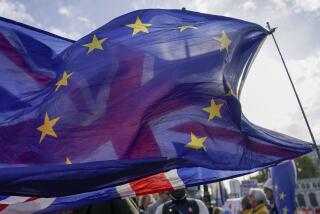Blair, Tories Play Up EU Advantages
- Share via
LONDON — Prime Minister Tony Blair, with the first cross-party coalition in a quarter-century here, on Thursday launched a campaign to sell Britain on the benefits of its membership in the European Union.
But with an eye on general elections in the next couple of years, the group calling itself a “patriotic alliance” stopped short of urging Britain to adopt Europe’s common currency, the euro, which had been the original intention of the “Britain in Europe” campaign.
The alliance brought together members of Blair’s Labor government and Conservative heavyweights at odds with their own party leader, William Hague, who has taken a hard line against Europe. Hague attacked the campaign in Thursday’s edition of the Times of London as a front for “abolishing the pound.”
Blair said the alliance’s goal is to rebut the “shrill clamor” of Euroskeptics who say that membership in the EU has damaged the British economy and relations with the United States, and will eventually drive the country into a federal superstate.
He argued that a strong Britain can help its European neighbors with economic reforms, that more than half of Britain’s trade is with Europe and that 3.5 million British jobs depend on that trade.
“Once in each generation the case for Britain in Europe needs to be remade,” Blair said, recalling the 1975 cross-party coalition that persuaded the British public to vote in favor of membership in what was then called the European Economic Community. “To quit Europe would be an act of economic mutilation.”
Speaking before an audience packed with political and business leaders, Blair was joined by senior members of his Labor government, new Liberal Democratic Party leader Charles Kennedy and former Tory government ministers Michael Heseltine and Kenneth Clarke.
Heseltine took on Hague and former Prime Minister Margaret Thatcher, who argued at last week’s Conservative Party convention in Blackpool that all of Britain’s problems in the last century stemmed from Europe.
“What happens in Europe is inseparable from what happens to our own trade, employment, investment and industry,” Heseltine said.
“I say with no disrespect to our neighbors, if we aren’t there, they will fix the rules their way. I want to fix the rules our way. You cannot wield a handbag from an empty chair,” he said in obvious reference to Thatcher’s famous accouterments.
He and Clarke denied accusations from Tory leaders that they were traitors to their party, saying they planned to vote Conservative in the next general election. But their participation drew the battle lines in any future vote on whether Britain should adopt the common currency.
Blair has promised a referendum on the euro but not before the next election. Public sentiment is running against adopting the common currency and, sensing this, Hague has decided to make it a central issue of the next election.
“No one can doubt that most people in this country do not want to abolish the pound. Keeping the pound is the common ground of British politics; but only the Conservative Party speaks for it,” Hague wrote in the Times of London.
On Thursday, Blair mentioned the euro just once, sticking to his usual cautious message that Britain would contemplate joining if all the necessary economic conditions were met in the 11-country euro zone.
“Everybody who has joined this campaign is in favor of the single currency in principle. None of us are saying we should join now,” Clarke said to nods from Blair.
Clarke’s and Heseltine’s participation in the campaign came a day after two other Conservative leaders attacked Hague’s Europe position. Former Prime Minister John Major said the new stance was “absurd and crazy” and former party chairman Chris Patten said he feared the party was fast becoming unelectable due to its hostility to Europe.
The issue of Britain’s relationship with Europe has long divided the Conservative Party and contributed to its overwhelming defeat in the 1997 election.
More to Read
Sign up for Essential California
The most important California stories and recommendations in your inbox every morning.
You may occasionally receive promotional content from the Los Angeles Times.













